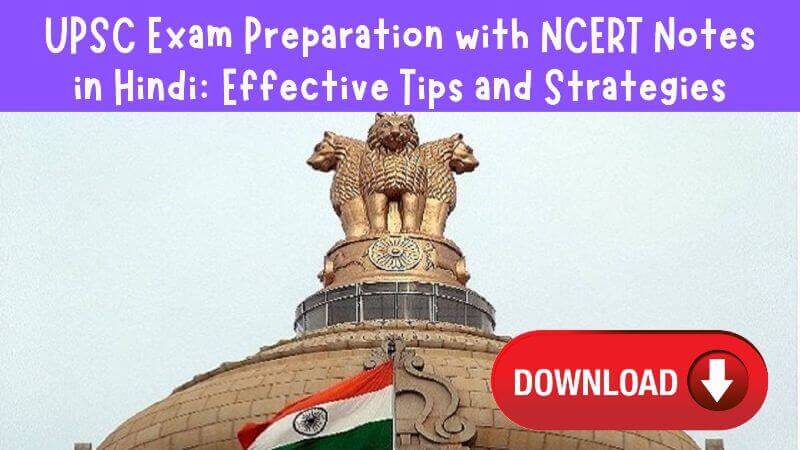Maximizing the Potential of NCERT Notes for UPSC Exam Preparation
The Union Public Service Commission (UPSC) holds a distinguished position as a governmental body responsible for conducting various examinations to recruit candidates for India’s civil services. Among its prestigious exams, the Civil Services Examination (CSE), popularly known as the IAS exam, stands out.
Regarded as one of the most challenging tests worldwide, the CSE demands a comprehensive understanding of an extensive syllabus. To tackle this daunting task, aspiring candidates often turn to the NCERT notes as an invaluable study resource. In this article, we will explore the significance of NCERT notes for UPSC exam preparation and provide effective strategies for their optimal utilization. Visit UPSC Official website: Click Here
NCERT Notes for UPSC in Hindi with best Exam Preparation Tips:
When utilized effectively, NCERT notes can significantly enhance UPSC exam preparation. Consider the following tips for making the most of these notes:
1. In-Depth Reading of NCERT Textbooks:
Begin your UPSC exam preparation journey by thoroughly reading the NCERT textbooks. Covering the material from start to finish, be sure to highlight important concepts and topics for future reference.
2. Taking Comprehensive Notes:
While reading the NCERT textbooks, take diligent notes of key concepts and topics. These notes will serve as valuable quick-reference materials during the revision phase.
3. Regular Revision:
Regularly revisiting your NCERT notes is essential for maintaining a fresh grasp of the covered concepts and topics. Aim to revise your notes at least once a week to ensure effective retention.
4. Supplementing Other Study Materials:
While studying alternative resources for the UPSC exam, leverage your NCERT notes as a supplementary reference. Doing so will help solidify the understanding of concepts and topics covered in the NCERT textbooks.
5. Solving NCERT Textbook Questions:
At the end of each chapter in the NCERT textbooks, you will find a set of questions. Make it a priority to solve these questions, as they will test your comprehension of the chapter’s concepts and topics.
6. Practicing Previous Year UPSC Questions:
Solving previous year UPSC questions is crucial in gaining insights into the types of questions that may arise in the exam. Utilize your NCERT notes as a reference while solving these questions to reinforce your understanding.
7. Engaging in Mock Tests:
Regularly participating in mock tests is indispensable for assessing your understanding of the concepts and topics covered in your NCERT notes. To simulate the actual exam experience, time yourself during these practice tests.
Specific Significance of NCERT Notes:
The NCERT textbooks cover a diverse range of subjects relevant to the UPSC exam. Let’s explore the significance of these notes for some key subjects:
1. Indian Polity:
The “Indian Polity” NCERT textbook provides a comprehensive understanding of the Indian Constitution and its various provisions. It delves into essential topics such as the introduction, fundamental rights, principles of state policy, and the Indian Parliament.
2. Indian Economy:
For a comprehensive understanding of various aspects of the Indian economy, the “Indian Economy” NCERT textbook serves as a valuable resource. Topics covered include economic planning, fiscal policy, monetary policy, and economic reforms.
3. Science and Technology:
The NCERT textbooks offer an extensive range of topics concerning scientific and technological advancements. Subjects covered include electricity and magnetism, motion, laws of force and motion, light, sound, and biotechnology.
4. Current Affairs:
The NCERT textbooks on current affairs offer insightful information because they cover a wide range of topics including national and worldwide events, policies, and advancements. Politics, the economy, foreign relations, the environment, and social issues are important subjects in India.
5. Environmental Science:
The NCERT textbooks on environmental science delve into topics concerning the environment
and its conservation. Key subjects covered include ecological systems, biodiversity, pollution, climate change, and sustainable development.
6. Sociology:
NCERT textbooks on sociology explore a comprehensive range of topics related to social structures, institutions, and relationships. Key subjects covered include family, caste, gender, religion, education, and globalization.
7. Political Science:
The NCERT textbooks on political science encompass a wide array of subjects concerning politics, governance, and international relations. Important topics covered include democracy, power, globalization, foreign policy, and international organizations.
8. Psychology:
The NCERT textbooks on psychology cover an extensive range of topics related to human behavior and mental processes. Subjects of significance include perception, memory, learning, personality, motivation, and emotions.
9. Mathematics:
Covering algebra, geometry, trigonometry, calculus, and statistics, the NCERT textbooks on mathematics offer a comprehensive exploration of these subjects. Key topics include linear equations, quadratic equations, circles, triangles, calculus, probability, and statistics.
10. English:
The NCERT textbooks on English cover a broad range of topics related to language, literature, and communication skills. Key subjects covered include grammar, comprehension, writing skills, literary devices, and critical thinking.
Conclusion:
The NCERT notes hold a position of paramount importance in UPSC exam preparation. Authored by subject matter experts, the NCERT textbooks serve as a trusted source of information across various subjects. Aligned with the UPSC exam syllabus, these textbooks cover fundamental concepts and essential topics necessary for a comprehensive understanding.
To effectively leverage NCERT notes in UPSC exam preparation, students should engage in thorough readings of the textbooks, take meticulous notes, regularly revise, use the notes as supplementary references, solve textbook and previous year’s questions, and actively participate in mock tests.
The UPSC exam is recognized as one of the most rigorous examinations globally, with an extensive syllabus to tackle. Aspirants must dedicate themselves to meticulous preparation and develop a strong foundation in the various subjects relevant to the exam.

Also Read: UGC NET June 2023 Answer Key: Download and Raise Objections | NTA
